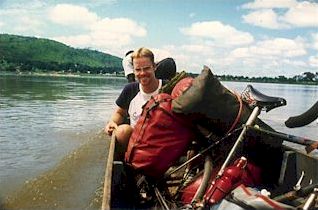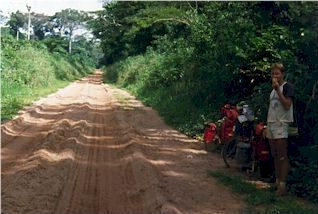In Kisangani, situated in the heart of Zaire and on the bank of a stream bearing the same name, one is reminded of the Belgian colonization of earlier days. But like the buildings of the former Stanleyville, the relations with Belgium are rapidly disintegrating. Ex-imperialists are forced to leave the country. There is a noticeable sense of dissolution and in the capital Kinshasa, the Belgian Embassy has closed down. Is it the mere liberation of an independent nation from its ruling state that I am witnessing?
With his business skills, it's dictator, Mobutu, could undoubtedly ensure a safe transition into a secure autonomy but money is being wasted on pompous prestige buildings. The nepotism and investments in private Swiss bank accounts go unnoticed. The majority of inhabitants are oblivious of political going-ons, as they live from hand to mouth in remote jungle settlements and the little money they do earn on markets or as plantation workers is often instantly spent on palm wine and a distillate of maize and manioc that contains 50% alcohol.
Once I have my legs stretched out underneath a set table, as was the case in Cameroon, at the American mission, it usually takes quite some persuasion to get my indulgent self back into the saddle and onto the road. The crossing of the border to the Central African Republic went fairly smoothly, putting aside the fact that, once again, I needed to apply my "I'll just wait here so long" strategy. By simply answering to all the unnecessary questions, the greedy border post officials were soon outwitted and left empty-handed. Time is money after all, even in Africa. The gravel road that spans the Savannah of the Central African Plateau and leads into the Capital Bangui is as wide as a freeway compared to the one through Cameroon. After heavy rains which, here too, is a regular occurrence at this time of the year, trucks are not allowed to pass this route and this showed in the quality of the road. I was hearing of a German cyclist who had passed through recently, on the back of a truck, suffering from malaria. Who could that be? My question was soon to be answered. In Bangui, while bribing a money thirsty police officer, who was fining me heavily for having driven up a one way, I suddenly heard my name being called out from amidst the crowd that surrounded me; Jens from Kelkheim, in good health again, and ready for a second joint mission, through Zaire.
 |
After a lengthy stay at a guesthouse of the French volunteers, we balanced our heavily loaded bicycles onto a narrow pirogue and set across the river Ubangui . The corruption continued with inexorable officers, at the Zairian border, on the other side of the river. So, we soon decided to give in to their relentless demands and cough up. Jens even received a nonessential cholera vaccination for only a couple of DM, on paper, that is! The roads that were to follow, on our way through the dense Zarianjungle, are beyond description. Huge muddy ponds alternated with continuous stretches of soft sand and, once again, we were forced out of the saddle, on many occasions, a "real pleasure" at 32°C and 95 % humidity. However, we were often better off than motorized road users.
 |
At one point, where a river had washed away the track, we simply carried our belongings across the waters to the opposite bank, where trucks were queuing and had been waiting for some days for the water levels to drop and the road to be repaired. It is astonishing to see the stoical calm and detachment these disasters are met with. Once, on cycling past the site of an accident, where the badly damaged truck, that had overturned, was still lying on its side, I could hardly believe my eyes. Instead of the expected casualties, I found the entire crew gathered in the shade of the wreck, in high spirits, drinking tea, chatting and enjoying the view, placidly waiting for a miracle to happen. Time seems to play an even lesser role here, than anywhere else in Africa: the Lingala word "lobi" when translated means "today" as well as "yesterday", and I find no better way to describe the African sense for time. The availability of foodstuff is not always guaranteed. Many kilometers separate the villages and in the way of nourishment, the offer on the markets consists of bananas, manioc fruit, canned sardines, worms and caterpillars, and dead monkeys. All the more appreciative were we of the occasional stays on tea and coffee plantations that we passed through. We got to stay for a few days on one of these, a plantation run by Belgians, and had a taste of this paradoxical lifestyle, between swimming pool and dinner invitations, in the middle of the jungle. Not as warm was our welcome at some of the Catholic missions in Zaire, where we even had doors closed on us.
Awaking one morning in a tiny village, where we had put up our tents next to the road, I find two of my most important bags missing. Stolen! Clothing, medication, spare parts and the irreplaceable photo films, gone! Even a military search operation into the jungle, called forth by the "chef de village" was unsuccessful. The suspects that were brought in for the investigation were tied up with ropes and half naked. At night we heard beatings and desperate screaming. What a horrible experience! The military is rash and cruel and it's officers are drunk most of the time.
For days now I've been waiting in Kisangani for the ship to arrive, that Jens had taken from Bumba. I had chosen to cycle the distance. Bruises on my legs and shoulders are telltale evidence of the acquaintance I had made with a little piglet that was crossing my path. Bad timing, I suppose. Apparently the ship is experiencing difficulties in navigating through the shallow waters. On another day, I am told that somebody aboard the ship had died and that the crew was now awaiting the funeral arrangements to be made. As I have said before, time is regarded differently over here. By the way, "lobi" also means "good bye". So, "lobi".
To download page Beginning of page Next page